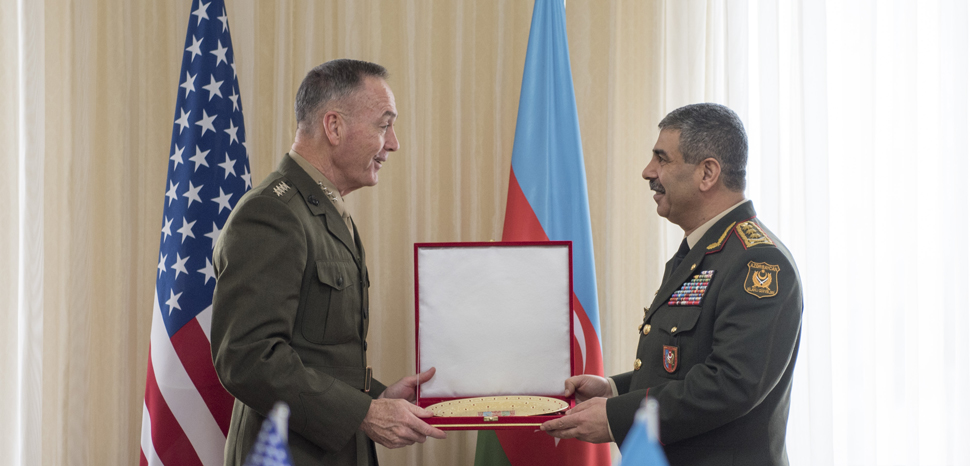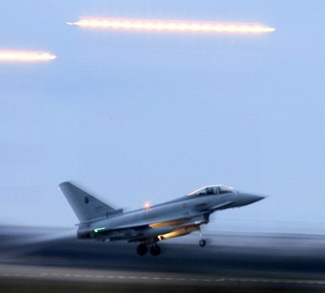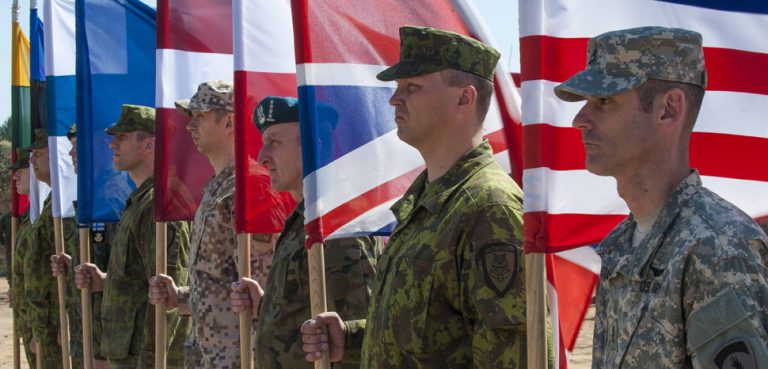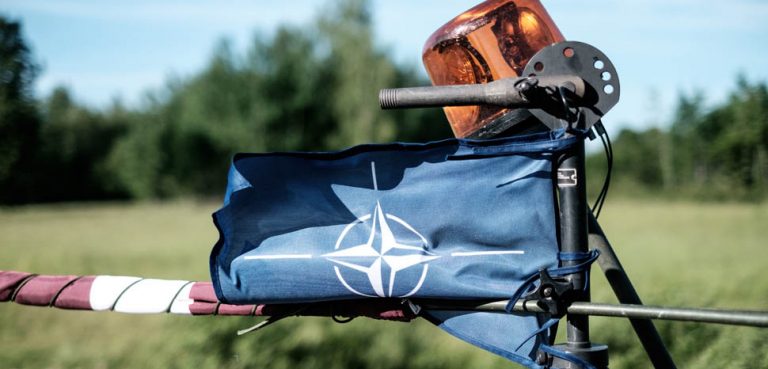The Republic of Azerbaijan is a strategic US partner in the Caucasus due to its proximity to Iran, its strong ties with Israel, and its role in Caspian Sea-related energy projects. Hence, the country’s snap parliamentary elections that took place on February 9 must be placed in the proper geopolitical context.
Washington-Baku Relations
Relations between the two countries have been progressing smoothly over the past year. One notable development was the fourth meeting of the Azerbaijan-US Economic Partnership Commission in Baku, with Peter Hass, Principal Deputy Assistant Secretary of State for Economic and Business Affairs, in attendance. It is noteworthy that the gathering, which took place in May 2019, is the first time that this group has met since 2012.
Other recent meetings include a gathering between [then-]Secretary of Defense James Mattis and Secretary of State Mike Pompeo with Azerbaijan’s Defense Minister Zakir Hasanov and Foreign Minister Elmar Mammadyarov in Brussels on July 12, 2018. Months later, in October, then-National Security Advisor John Bolton visited all three Caucasus states. More recently, Minister Mammadyarov met with Bolton once again during a June 2019 trip to Washington, DC.
There are also occasional education-related initiatives. Case in point, this past November 2019, the Azerbaijan State Agrarian University (ADAU) and Oklahoma State University signed a Memorandum of Understanding on cooperation in the field of agriculture.
This all suggests that there is a cordial relationship between the two governments, though high-level meetings are somewhat scarce.
As for the elephant in the room, namely the territorial dispute between Azerbaijan and Armenia, Washington “strongly supports efforts to peacefully resolve the Nagorno-Karabakh conflict through the OSCE Minsk Group process and promote regional stability, peace, and prosperity.” This dispute has been widely analyzed, and the situation remains generally the same, though a new wave of violence broke out in 2016.
It is doubtful that there will be any breakthrough in the negotiations anytime soon, regardless of Washington’s support for dialogue. The leaders of Armenia and Azerbaijan met in mid-February 2020 to discuss the dispute, with little progress.
Trade and investment
When we talk about trade and investment opportunities in Azerbaijan, we have to talk about energy. In fact “crude oil is the single largest import from Azerbaijan to the United States. U.S. companies are involved in offshore oil development projects in Azerbaijan,” in the words of the US State Department. Moreover, at time of writing, the US-based company Halliburton has signed a memorandum of understanding with Azerbaijan’s SOCAR-AQS company to create a new joint-venture based in Baku. The objective is to explore opportunities in the “onshore and offshore oilfields of Azerbaijan.”
Alas, trade in other areas is very limited, though according to Azerbaijani officials, the country is “the largest US partner in the South Caucasus. [In 2018], trade between the two countries amounted to $860 million” (exports from the United States came in at $530 million, and from Azerbaijan, $330 million). One piece of good news is that the number of US tourists to the Caucasus state is reportedly increasing, which helps foment people-to-people connections and brings an influx of tourist-money to the country.
As a corollary to this section, it is worth noting that Azerbaijan is generally regarded as a safe destination for investments. There is a bilateral investment treaty between Washington and Baku, and investors can recourse to arbitration via the International Center for the Settlement of Investment Disputes. Moreover, the Overseas Private Investment Corporation (OPIC) has invested around $230 million in Azerbaijan across 24 business projects in the past two decades, with a specific focus on the BTC oil pipeline (completed in 2006), franchising, banking, microfinance, and hotel and hospitality sectors, according to the US State Department.
Defense ties
Tensions between the Trump administration and Tehran have resulted in greater attention from Washington to Iran’s neighbors, particularly Azerbaijan. For example, “the US Defense Department allotted $58.6 million in fiscal year 2018 and $42.9 million the following year to Azerbaijan’s border and customs services, according to Pentagon reports to Congress obtained and published by Security Assistance Monitor (SAM), a Washington, D.C. think tank. The funding “far outstripped the assistance given to nearly any other country in the region.” The report adds that “the U.S. also has donated second-hand patrol boats to Azerbaijan, as well as to Kazakhstan and Turkmenistan [to patrol the Caspian Sea]. But the dollar figure on this new aid program is significantly higher than anything the U.S. has spent before.”
Additionally, Azerbaijan’s military teams up with the Oklahoma Army National Guard as part of the US National Guard’s State Partnership Program. In mid-2018, a delegation led by Major General Michael Thompson, the commander of the US Oklahoma Army National Guard, went to the Caucasus state and held a meeting in the International Military Cooperation Department of the Ministry of Defense and visited the military games center of the armed forces there.
More recently, this past January 2020, the “U.S. Embassy’s Office of Defense Cooperation sponsored a joint military medical strategy meeting last week in Baku, to help participants focus on identifying long-term planning goals for joint military medical capabilities.” The gathering included personnel from the United States Air Force-Europe (USAFE), the United States Army-Europe (USAREUR), the Oklahoma National Guard, and counterparts from Azerbaijan’s Ministry of Defense and the United Kingdom.
Azerbaijan’s tricky foreign policy
Azerbaijan is in a tricky geographical location, as it is within the sphere of interest of Iran, Russia, and Turkey. Overall, in the words of the Jerusalem Post, the country has maintained a “balanced foreign policy toward its neighboring countries since Heydar Aliyev came to power about 25 years ago.” (Armenia notwithstanding, obviously).
While Washington has a particular way of looking at Tehran, Baku has maintained friendly ties with its southern neighbor. There is also a level of reliance to take into account as well, since as a November 2018 op-ed in the Jerusalem Post explains, “Baku exports natural gas to Iran, and in exchange Iran provides natural gas and other necessary goods to Nakhchivan, an autonomous republic within Azerbaijan, which does not have a land border with Azerbaijan.”
Hence, “despite the fact that Azerbaijan is an ally of the U.S., it is unrealistic to expect that it will take on the role of isolating Iran for a number of reasons, such as Iran’s importance as a neighboring country,” the article concludes. A war between Washington and Tehran would surely have very negative repercussions for Azerbaijan, which would likely receive Iranian and ethnic-Azerbaijani refugees, while trade and investment (e.g. the construction of Rasht-Astara section of an multinational railway to promote transportation) would likely be suspended.
Interestingly, while Azerbaijan maintains cordial relations with one of Washington’s biggest foes, Baku also has close ties with one of its biggest allies: Israel.
Similarly, it is worth noting that Azerbaijan also has a relationship with NATO. Bilateral ties started with the Partnership for Peace program in the 1990s, and these days they are carried out under the umbrella of the Individual Partnership Action Plan (IPAP). Speaking of Europe, Azerbaijan maintains strong commercial ties with the European Union, which is Azerbaijan’s “main trading partner, accounting for around 41.7 % of the country’s total trade.”
As for Russia, Moscow and Baku have a complicated relationship. Moscow, would certainly like to see Azerbaijan return to its sphere of influence, perhaps by joining the Eurasian Economic Union, but Moscow’s ties with Armenia make this problematic.
Finally, in a 2019 interview, President Aliyev highlighted how “in recent years, the Black Sea basin in the geopolitical aspect has become sensitive to political, military, economic, energy influences from the superpowers.” Hence, Azerbaijan supports multinational organizations, including the Black Sea Economic Cooperation forum to promote “cooperation between the countries of the South Caucasus and the countries of the Black Sea coast.” This would certainly be of interest to the U.S., which has increased its naval presence in the Black Sea in recent years due to tensions with Russia.
The February 9 elections
It is in this geopolitical context that Azerbaijan held snap elections for its 125-member unicameral parliament this past February 9.
The Caucasus nation has been ruled by the Aliyev family since 1993, with current President Ilham Aliyev succeeding his father in 2003, hence there was great expectation regarding what would happen when Parliament was up for grabs on 9 February. According to results, Aliyev’s New Azerbaijan Party won over 70 seats, independent parties won the rest, while “one opposition candidate has won a seat.” (Some opposition parties reportedly boycotted the vote).
Reactions to the elections have been mixed. For example, the British election observer Nabil Ayad, Director of the Diplomatic Academy of London, stated “We felt that everything was done nicely and smoothly … this is part of the democracy building process in this country.”
On the other hand, a statement by the US embassy in Baku expressed that the “February 9 parliamentary elections transpired in a restrictive legislative and political environment that prevented genuine competition. The elections were marked by limitations on the freedom of media and assembly.” Bilateral ties have historically been affected by Section 907 of the US Freedom Support Act, via which Washington cannot provide aid to Azerbaijan over the Nagorno-Karabakh issue with Armenia, though the US president can waive this article. Hence, it will be important to monitor how US agencies and institutions, like for example the US-Azerbaijan Congressional Caucus, behave after the vote.
Final thoughts
Determining the future of US-Azerbaijan relations is a complicated affair. The February 9 elections were certainly not what the US embassy in Baku and many organizations were hoping, in terms of transparency and the participation of opposition parties.
With that said, Washington’s interest in Azerbaijan will continue to grow, particularly in the area of defense due to Iran and Russia, as well as the interest by US energy companies. As for Baku, the Caucasus is a complex neighborhood, with lots of interests and issues to keep in mind, and while Washington is geographically distant and sometimes critical of its domestic situation, it is a partner that Azerbaijan should continue to keep close.
The author would like to thank Lucia Scripcari, a LLM candidate at Koc University (Istanbul), for her editorial and research assistance.
The views expressed in this article are those of the authors alone and do not necessarily reflect those of Geopoliticalmonitor.com or any institutions with which the authors are associated.




